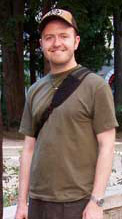Irish chat by the Adriatic

Steven McLeod, who went to Italy on a Canadian Irish Studies scholarship, poses on a street in Trieste.
Courtesy of steven mcleod
The great Irish writer James Joyce had complicated feelings about his homeland, and lived most of his life in Trieste, Italy. On June 25, Joyce enthusiasts of all ages from all over the world converged on Trieste to take part in the 10th Annual Trieste Joyce School.
Lectures were given at the Museo Revoltella, Trieste’s Modern Art Museum. They varied in theme from Eric Bulson on Dublin’s geography as it is treated in Joyce’s works to complimentary presentations by Luca Crispi, Stacey Herbert and Dirk Van Hulle on the “genetic” approach to Joyce.
Crispi and Van Hulle held workshops throughout the week in literary genetics, the study of a work’s conception through a close look at its manuscripts and editions. Afternoon seminars were held on Joyce’s Dubliners, Ulysses, and Finnegan’s Wake.
The week was not exclusively spent in auditoriums and lecture halls, however. We sampled the sights and foods of the culturally rich port city, eating freshly baked pizzas and decadent pastas in charming restaurants. One night, we travelled to Italy’s northern border to Milic, an osmiza, or traditional Slovenian restaurant. Afterwards we sat outside and enjoyed the cool evening in the northern Italian mountains.
The evenings spent singing in dimly lit pubs were the most memorable. Vinh Nguyen, Vietnamese translator of Joyce’s Portrait, treated us to ballads in his mother tongue. Ron Ewart, who led the seminars on Joyce’s Finnegan’s Wake, offered us a jolly rendition of the Irish favourite “Molly Malone.” But the star of the show was undoubtedly John McCourt, whose booming tenor filled the pub with “Finnegan’s Wake” and “Love’s Old Sweet Song,” two of Joyce’s favourites. McCourt and Antonio Bibbo, a master’s student from Naples, performed a duet of “O Solo Mio” which received loud applause.
Later in the week, as the sun set on the Adriatic and the sky turned a deeper blue, we sat on a covered waterside terrace, ate fruit and listened to the poetry of Eamon Grennan. Whether about his own poetry or that of celebrated Italian poets, Grennan was eager to talk with us younger literary scholars and to learn about our academic and artistic ambitions.
John McCourt and Renzo S. Crivelli, directors of the Trieste Joyce School, have created a delightful summer program, a chance for Joyce scholars of all levels to come together in a casual but impassioned environment. By the end of the six days, 81 people from countries all over the world had become dear friends.
It is a week I will never forget and an experience I hope to repeat at next year’s Trieste Joyce School, which promises to be just as exciting.